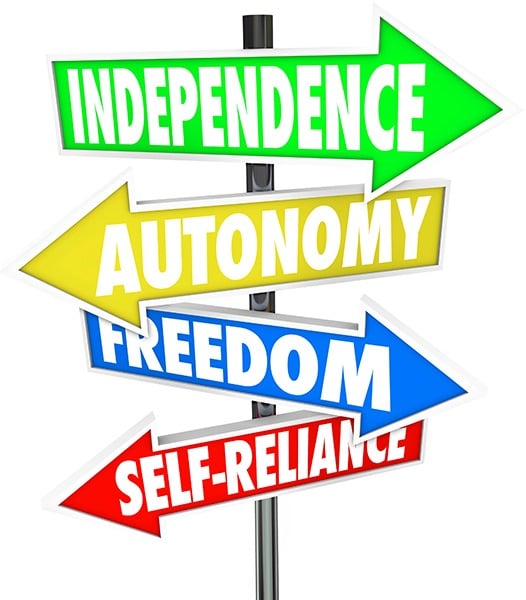What Is Independence? One Man’s Opinion
Guest Post by Dennis Miller at Miller On The Money
My recent article about The American Dream prompted several questions:
What Is Independence?
How do you know if you really have it?
How can you measure it?
Are you ever there, or is it transitory?
Cambridge Dictionary offers examples:
- freedom from being governed or ruled by another country.
- the state of wanting or being able to do things for yourself and make your own decisions, without help or influence from other people.
- the ability to live your life without being helped or influenced by other people.
The spectrum is wide, from the Declaration of Independence, adult financial independence, to suggesting parents should allow their children some independence.
My grandson loved his first job. I asked, “What’s the best part?” He responded, “Grandpa, it’s not having to constantly ask mom and dad when I want to buy something.”
While a teenager has one perspective, as he progresses through life his definition of independence will certainly change.
Start at the top!
Kathy Fettke explains:
“WHAT IS THE AMERICAN DREAM & WHEN DID IT START?
The Declaration of Independence protects the idea and pursuit of the American Dream. It states, ‘We hold these truths to be self-evident, that all men are created equal, that they are endowed by their Creator with certain unalienable Rights, that among these are Life, Liberty and the pursuit of Happiness.’”
Investopedia explains the importance of a free society:
“Achieving the American dream requires political and economic freedom, as well as rules of law and private property rights. Without them, individuals cannot make the choices that will permit them to attain success, nor can they have confidence that their achievements will not be taken away from them through arbitrary force.
…. It offers the freedom to make both the large and small decisions that affect one’s life, the freedom to aspire to bigger and better things and the possibility of achieving them, the freedom to accumulate wealth, the opportunity to lead a dignified life, and the freedom to live in accordance with one’s values—even if those values are not widely held or accepted.”
Choices….
Our founding fathers despised a king with a powerful army confiscating wealth, “taxation without representation,” to suit the needs of the king and his elites.
The American dream allows individuals “independence” to own property, make their own choices, and feel confident it will not be confiscated by arbitrary force. You can live as you damn well please, as long as you don’t harm others.
The dictionary differentiated between wanting and the ability to “do things for yourself and make your own decisions, without help or influence from other people.”
One can want independence, but the ability to achieve and maintain that independence is a constant struggle.
Government’s Hidden Agenda
Our founders didn’t envision a “nanny state.” Friend Richard J. Maybury likes to point out, government is inherently evil; a never-ending struggle between a controlling government and the will of the people.
When President Roosevelt proposed his New Deal to lift the country out of the Great Depression, Herbert Hoover warned, “The minute you allow the public direct access to the treasury, you are going to create chaos beyond anything mankind has ever known.”
While the American dream allows individuals “independence” to make their own choices, power-hungry politicos want to take that away. Their favorite method is using tax dollars to create a dependency class. The bigger the nanny state, the more power the government has. “If you don’t vote for me, my opponent will take your “free stuff” away.”
Our recent discussion about the European Union provides a good example; many nations regret giving up much of their independence to a powerful central government.

